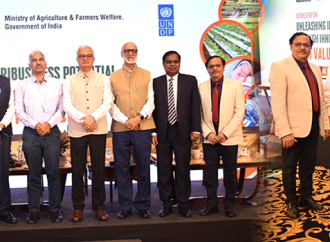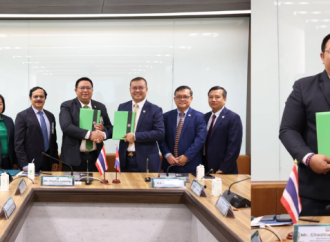Second IFAD-APRACA FinPower Regional Rural Finance Policy Forum on Strengthening Participation and Dialogue among Key Stakeholders, Hosted by the Vietnam Bank for Agriculture and Rural Development 25 March 2008, Hanoi, Vietnam Keynote Statement by Ganesh Thapa Mr. Thiraphong Tangthirasunan, BAAC President and APRACA Chairman, Dr. W.A. Wijewardena, Deputy Governor, Central Bank of Sri Lanka Dr.
Second IFAD-APRACA FinPower Regional Rural Finance Policy Forum on
Strengthening Participation and Dialogue among Key Stakeholders,
Hosted by the Vietnam Bank for Agriculture and Rural Development
25 March 2008, Hanoi, Vietnam
Keynote Statement by
Ganesh Thapa
Mr. Thiraphong Tangthirasunan, BAAC President and APRACA Chairman,
Dr. W.A. Wijewardena, Deputy Governor, Central Bank of Sri Lanka
Dr. Do Tat Ngoc, VBARD Chairman and APRACA Vice-Chairman,
Mr. Benedicto Bayaua, APRACA Secretary General,
CEOs and Senior Officials of APRACA Member Institutions,
Distinguished Participants,
It is my great honour to be invited to deliver a keynote statement on behalf of the International Fund for Agricultural Development (IFAD) before this august gathering of leaders of APRACA member rural financial institutions and agencies. IFAD’s collaboration with APRACA dates back to the mid-1990s when under the Microserv programme implemented between 1996 and 2001 with IFAD’s funding support, APRACA disseminated replicable rural finance models. The programme showed that the replicability of innovative models was further enhanced when conducted through an organization with an existing, wide geographic network such as APRACA, thereby yielding more cost-effective results, broader geographic reach, and assured project continuity.
This collaboration between APRACA and IFAD got a further boost in 2007 with the launching of a five-year programme for the empowerment of rural poor through rural finance innovations or the FinPower Programme. The objectives of this programme are to foster an enabling, and pro-poor policy environment and regulatory framework for sustainable rural financial systems; to encourage innovative approaches to rural finance; and to share information and lessons from projects and programmes to promote replication of successful approaches in the region.
Under the FinPower Programme, the first regional policy dialogue forum was organized in Kunming, China in April 2007, which many of you attended. The Kunming Forum focused on assessing the status of rural finance policy environment and regulatory framework in the Asia-Pacific countries. A number of important issues were discussed at the forum, including interest rate deregulation, sustainability of self-help groups, financial inclusion, microfinance for agriculture, climate change and adaptations in micro/rural finance projects, etc.
A Regional Forum on Rural Finance Innovations/Asia-Africa Dialogue was organized by APRACA with the objectives of disseminating innovations and best practices in both Asia and Africa; conducting a dialogue to discuss common efforts, requirements and thrusts; and generating ideas, commitments and laying the groundwork for a sustainable plan. The Forum highlighted the new paradigm of the rise of microfinance to serve the poor but noted the nagging problem of the rural poor and farmers, particularly in remote areas being left out of the microfinance revolution. The Forum also identified two new threats, viz. the concern arising out of the political interest to re-impose interest rate restrictions, and the competition for farm products due to biofuel development, and the rising cost of energy. Three regional presentations (Africa, Maghreb countries, and Asia) were made on rural finance innovations and best practices, which were followed by a plenary discussion on prospective areas of collaboration between the two continents in areas of training, research, business linkages, and e-commerce.
This FinPower Regional Policy Forum is expected to highlight experiences in strengthening participation and dialogue among key stakeholders, particularly the inclusion of the rural poor in the rural finance policy and decision making processes. In my statement, I would like to share some of IFAD’s experiences in promoting stakeholder participation at different levels.
A growing focus on sustainability in the late 1990s and the realization that distorted rural financial markets resulting from subsidized credit can diminishing project impacts, led IFAD to formulate its Rural Finance Policy (RFP) in 2000 . The RFP’s objective supports IFAD’s vision of supporting a sustainable rural finance sector that meets the financial needs of the rural poor. It sets standards for and offers guidance to IFAD staff and stakeholders on good practice rural finance project design, implementation, and monitoring. Strengthening stakeholder participation is one of the four objectives of this policy. The remaining three objectives are enhancing institutional sustainability and outreach to the rural poor, supporting a wide diversity of institutional models and delivery mechanisms, and promoting a conducive policy and regulatory environment.
IFAD believes that good stakeholder engagement ensures that a project, be it during design or implementation, takes advantage of the opportunities stakeholder input affords and identifies all possible risks associated by direct and indirect impacts on stakeholders. A strong stakeholder process can also encourage project ownership, a particularly important consideration once donor funding has been exhausted. The objectives of good stakeholder participation are to ensure that project design considers all relevant stakeholders, creates an appropriate space for voices to be heard, encourages stakeholder participation and ownership, and takes advantage of stakeholder participation.
Special emphasis needs to be placed on individual and groups of stakeholders normally marginalized from mainstream finance. If client or user group ownership of the pro-poor financing mechanisms (e.g. SHGs) is being planned, then considerable time and effort needs to be spent in identifying those stakeholders who will take leadership roles in the project. Rural finance projects in very low population density areas are often user owned. Sustainability of these projects is very much tied to user buy-in to the model as they will be responsible for managing the mechanism. Strong stakeholder relations with potential leadership stakeholders are integral to project success and identifying them early in the process is critical.
Let me now share with you some important findings of the evaluation of IFAD’s rural finance portfolio conducted in 2006, whose objective was to assess the quality and effectiveness of its Rural Finance Policy (RFP) . This evaluation analyzed corporate policy and strategies, country strategies and projects of twenty countries from around the world, including four from Asia and the Pacific (Bangladesh, China, Laos and the Philippines).
Three levels of stakeholder participation were considered by the evaluation: being consulted, being actively involved, and having decision-making rights. The evaluation found slightly greater degree of involvement of stakeholders during project design and implementation following the introduction of the rural finance policy. However, there was virtually no change in the degree of simple consultation or in stakeholders’ role in decision-making. The quality of participation was often limited to short and one-time only focus group meetings. Careful analysis of the financial needs of the poor was usually limited.
The Asia-Pacific Regional evaluation found that IFAD’s country strategy for Bangladesh addresses the principle of stakeholder participation, including IFAD’s participation in multi-donor initiatives such as the Local Consultative Group to deepen financial markets, collaborating with PKSF (apex body for microfinance) and MFIs themselves . The country strategy for China also emphasizes stakeholder participation, in particular the strategy suggests that IFAD improve knowledge and experience sharing with like-minded partners such as DFID, ADB in order to support reform of the rural finance sector and to give it a poverty focus.
IFAD’s country strategy for Laos emphasizes stakeholder participation and support for village savings and credit associations, which result in the diversification of the rural financial infrastructure. Despite IFAD’s investments in microfinance in the 1990s, IFAD’s country strategy for the Philippines does not address the key challenges in rural finance explicitly, perhaps because the strategy was formulated prior to the adoption of the rural finance policy. The new country strategy, which is currently being finalized addresses these challenges.
The degree of stakeholder participation was found to be mixed in IFAD-supported projects that were reviewed by the evaluation. Generally, the poor and the retail level financial institutions that serve them were not key players in the design process. As a result, their buy-in and understanding of the project was limited.
More specifically, in Bangladesh, the design of two most recent projects promoted stakeholder participation. Roundtable meetings were held with potential NGOs that would receive on-lending funds from the apex institution, PKSF. Also, sustainable livelihoods analysis was carried out for the Microfinance and Technical Support Project, which involved extensive participatory rural appraisal (PRA) sessions with potential beneficiary groups. A poverty analysis was done for the Microfinance for Marginal and Small Farmers Project, where a series of participatory “financial landscaping” exercises were conducted, linked to participatory wealth rankings. These tools were helpful in understanding how the rural poor used their limited financial resources.
In China, though stakeholder participation is essential for programme implementation through Village Implementation Groups, the evaluation found that the poor and the retail level financial institutions were not part of the decision-making process. During the field visit, project staff mentioned that most projects were initiated by IFAD and higher levels of government. The level of stakeholder participation was very high in the Laos projects. It was particularly substantial in the Oudomxai Project where village savings and credit groups manage themselves. The Sayabouri Project has changed its credit implementation methodology to replicate Oudomxai Project’s village groups.
Through the Performance Based Allocation System, IFAD engages with the governments in promoting policy reforms in microfinance and rural finance in countries of the region where it has ongoing projects and programmes. Under this system, countries which embark on policy reforms receive greater allocation of funding support from IFAD. The indicators for monitoring progress relate to the role of financial services in the rural development process, the extent of provision of rural financial services, legal framework for the promotion and regulation of rural finance, and inspection and supervision arrangements covering rural non-bank financial operators.
In some countries, we also work closely with NGOs in policy advocacy work, including in microfinance/rural finance area. However, we see the need to enhance the role of farmers and other grassroots clients in policy advocacy work in rural and microfinance. IFAD has developed a regional programme to support farmer organizations, both in South Asia and South East/East Asia to strengthen their capacity for policy advocacy. This programme is expected to be implemented beginning July of this year.
In collaboration with the Food and Agriculture Organization (FAO), we are currently implementing a regional pro-poor policy analysis and dialogue programme covering four countries in South Asia (India, Nepal, Pakistan, Sri Lanka) and four from South East/East Asia (Cambodia, China, Indonesia and Vietnam). The purpose of this programme is to enhance the capacity of key government ministries, including Ministries of Agriculture in undertaking policy analysis and formulation, in collaboration with the civil society and the private sector. In country level inception workshops held in 2007 in these eight countries, a number of policy issues have been identified for further research and analysis, including those relating to financial service delivery in the agriculture sector.
To sum up, IFAD’s experience in promoting stakeholder participation in rural finance projects has only been moderately successful. Areas that need improvement include the quality of participation in project design and implementation, and in enhancing the role of stakeholders, particularly the rural poor in decision-making including policy dialogue. I am happy to note that three different panels in this forum will address these participation-related issues through best practice experiences of three different sets of stakeholders—grassroots clients, rural financial institutions, and partner-assisted projects. I look forward to thought provoking presentations by leading authorities and experts and an active discussion among all participants of this forum. I believe that this will promote mutual learning and knowledge sharing among APRACA member institutions.
Thank you very much for your attention.















